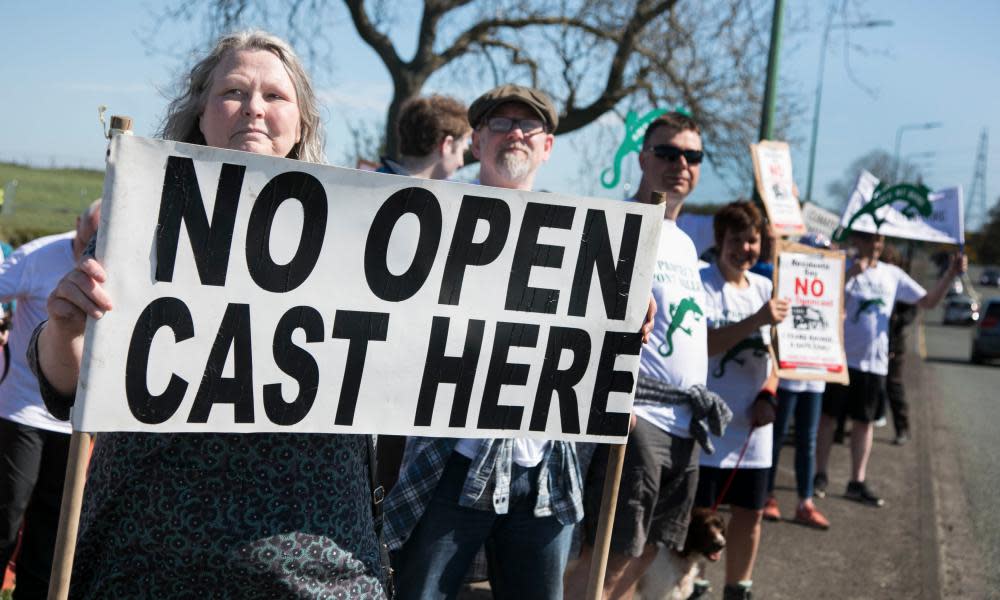Ministers to review Durham open-cast mine decision

The government is to review a decision to allow open-cast coal mining in a valley in County Durham.
Lawyers for the government have written to campaigners to say their decision-making was flawed and agreed to look again. The mine in the Pont Valley, known as Bradley, began operating last year after four decades of opposition.
This week, James Brokenshire, the communities secretary, told campaigners the decision not to revoke permission for the mine would be re-examined.
The move comes as Brokenshire is also considering whether to grant planning permission for another open-cast mine, at Druridge Bay in Northumberland. The mines are operated by Banks Group, which is at the forefront of open-cast mining, despite the government’s pledge to phase out coal by 2025.
Campaigners against the Bradley site were told this week by government lawyers that the decision would be reviewed after they threatened a judicial review of Brokenshire’s failure to step in and stop the mine from operating.
Local resident and campaigner June Davison, who lives near the Bradley site, said: “As a result of the government’s flawed decision, we have watched from our homes as a much-loved habitat has been ripped apart, and we have suffered coal dust and noise 12 hours a day.
“Within weeks, explosions will begin just 500 metres from our homes as they blast away the earth in preparation for destroying a whole new section of the valley for coal, unless the government acts.
“The secretary of state can’t repair the damage that has been done here but the least he can do is stop it getting worse. We are fighting back for what remains of the wildlife in the Pont Valley, for the climate and for the health of our community.”
In their letter, government lawyers said they had failed to take into account comparisons between Bradley and Druridge Bay open-cast mines. The latter was rejected last year by Sajid Javid, Brokenshire’s predecessor, on the grounds of its impact on climate change and damage to the landscape and community.
The letter said: “We have identified a flaw in the original decision-making process … in the light of this we accept that the matter needs to be considered by the secretary of state on a proper basis.”
Anne Harris, of the Coal Action Network, said: “The government should seize this opportunity to end the dirty industry of open-cast coal extraction for good. Supporting either Bradley or Druridge Bay would be inconsistent with their promise to end coal use in power stations by 2025.”
The Bradley mine, which intends to extract 500,000 tonnes of coal, is opposed by the Durham Miners’ Association.
Liam Carr, another local resident, said: “The government should look again at revoking permission for Bradley and look very closely at any new open-cast coal mine applications. This region was built on coal, we are rightly proud of our past. Coal is our heritage, not our future.”
Brokenshire is expected to announce his decision on whether to grant planning permission for the open-cast site at Druridge Bay – the largest of the Banks Group’s proposed open-cast mines – within weeks.
Mark Dowdall, environment and community director at the Banks Group, said: “Work is continuing to progress well at Bradley in the safest, most efficient and most environmentally responsible way possible, with more than 40 people from in and around the local area now directly employed at the site, and we do not believe there would be any justification for the revocation of the planning permission that was granted to the scheme through the appropriate processes.”
But Tony Bosworth, a campaigner at Friends of the Earth, said ministers must act to avoid climate chaos. “Coal is one of the dirtiest fossil fuels and it belongs in the history books, not in an energy system for the 21st century. Our energy future must be based on energy-saving and renewable energy, not on more fossil fuels,” he added.

 Yahoo News
Yahoo News 
